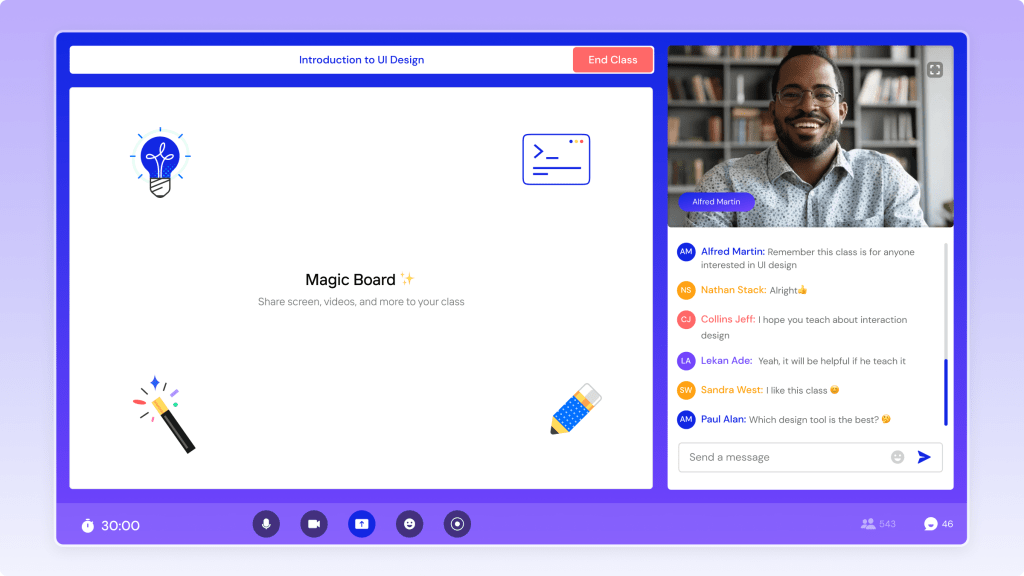Techstars-backed Nigerian edtech Klas raises $1M for global scaling of online teaching platform

Nigerian online teaching platform Klas has raised $1 million in pre-seed funding led by Ingressive Capital, with participation from Techstars, HoaQ, and several angel investors. Founded in 2022 by Nathan Nwachuku and Lekan Adejumo, Klas enables users to create and sell e-books, courses, and live classes.
The platform offers essential class components such as scheduling, payments, community features, analytics, and video conferencing, catering to various subjects from coding and design to finance, art, and languages.
“You can think of it the same way you’d think of Shopify. What they are doing for online stores where anyone can set up their stores and sell anything online is what Klas is trying to do for its users by helping them set up online schools and run classes,” co-founder and CEO Nwachuku said to TechCrunch in an interview.
Nwachuku founded Klas when he was 18. Three years before that, he was in an accident where he lost an eye, resulting in a six-month break from school. During this period, with a passion for physics and emerging from a two-month coma, Nwachuku sought to stay engaged and contemplated starting an online physics class where he could get paid for teaching lessons. However, he encountered some complexity in existing platforms, an experience that led to the first ideation of a streamlined solution that would become Klas.
On the call, the founder shared that after graduating high school and having self-taught coding, he declined a scholarship to Canada, dropping out of college. Instead, he committed to building Klas full-time and finding his co-founder and CTO Adejumo in 2021 before raising an angel round of $180,000, launching the platform and getting into Techstars the following year. Some investors in that round include founders of Nigerian tech startups like PiggyVest’s Odun Eweniyi and Spleet’s Tola Adesanmi.
Online education platform Kajabi helps creators earn money for sharing their expertise
Nwachuku identified a gap in the market where incumbent platforms like Kajabi and Thinkific can be overwhelming for first-time users due to the maturity of their products. As a result, Klas could play to its late mover advantage by providing a simple tool set and user-friendly experience, making it accessible for beginners to effortlessly host engaging online classes amid the rising global demand for online education, especially for these platforms to train the next workforce.
“We’re hyper-focused on a closed ecosystem, unlike these other big companies, who are basically integration toolkits and where everything is fully integrated into the platform. For class experiences, they might offer Zoom or Google Meet; for class management, maybe Slack and all that. But with Klas, everything, including our virtual classroom, was built from the ground up. We don’t use Zoom or Google Meet; we actually built our tool called KlasLife, which doesn’t even use any video API; this was built from scratch and with a very unique video architecture,” he claimed.

Today, Klas boasts a user base of over 5,000 online schools (creators), which have earned “hundreds of thousands of dollars” on the platform according to Nwachuku, and 300,000 learners spanning over 30 countries. While it is part of a rare group of African startups serving a global audience, the majority of its users are based in Nigeria. Currently facilitating transactions in naira for Nigerian users and dollars for those outside Nigeria, the edtech startup aims to amplify its international presence, focusing on India, its second-largest market and North America, where the incumbent players in the industry have the bulk of their customer base. The move aligns with the startup’s strategy to address currency devaluation concerns, and it includes plans to enhance user experiences through localized currency options in various countries.
Klas, aiming to power up to 100,000 online schools globally by 2027, presently provides a free plan with a 5% transaction fee. Although positioned as a cost-effective alternative to other platforms like Kajabi and Thinkific (whose prices range between $49 and $399), Klas, in a bid to boost its revenues, may become as pricey in the coming months, introducing an enterprise product targeted at upskilling employees in large companies at $199 per month.
“It has been a rewarding experience to have invested in Klas at the earliest stage of the company based on the core abilities of the co-founders Nathan and Lekan and the vision they set for the company,” managing director of Techstars Toronto Sunil Sharma said of the investment in a statement. “This confidence was further demonstrated by our follow-on investment in the company, something we like to do when presented with exceptional opportunities.”






